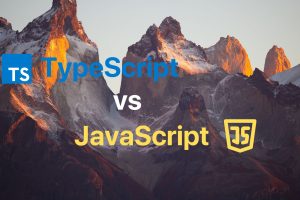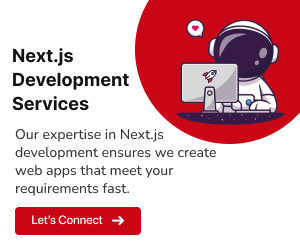In the fast-paced world of web development, choosing the right technology and development team is crucial for the success of your project. Next.js, a popular React framework, has gained significant attention for building high-performance web applications. If you’re in the United States and looking to hire a Next.js development company, you need to follow a systematic approach to ensure you make the right choice. In this blog post, we’ll guide you through the process of evaluating a Next.js development company in the US.
Know Next.js
Next.js is a powerful and popular JavaScript framework that simplifies the development of modern web applications. Developed by Vercel, it has gained significant traction in the web development community, particularly for building fast, scalable, and SEO-friendly applications. Here’s what you need to know about Next.js:
What is Next.js?
Next.js is an open-source React framework that adds server-side rendering (SSR) and static site generation (SSG) capabilities to your React applications. SSR improves page load times by rendering pages on the server and sending fully rendered HTML to the client, while SSG pre-builds pages at build time, allowing for even faster loading. This combination of client-side and server-side rendering makes Next.js highly performant.
Key Features of Next.js
Next.js comes packed with a range of features that make it a preferred choice for web developers
Server-side Rendering (SSR):
Next.js allows you to render pages on the server, improving performance and SEO optimization.Static Site Generation (SSG):
You can pre-render pages at build time, resulting in incredibly fast loading times for your website.Routing:
Next.js provides a straightforward and flexible routing system, allowing developers to create complex navigation structures with ease.Automatic Code Splitting:
It splits your JavaScript code into smaller bundles, ensuring that only the necessary code is loaded for each page, optimizing load times.Hot Module Replacement (HMR):
Developers can see changes in real-time without manual refresh, streamlining the development process.API Routes:
Next.js simplifies the creation of API endpoints, enabling seamless interaction between your frontend and backend.Dynamic Imports:
You can load JavaScript modules dynamically, reducing initial bundle size and improving performance.Optimized Image Loading:
Next.js automatically optimizes and serves responsive images, enhancing website speed and user experience.CSS Support:
Whether you prefer CSS modules, styled-components, or another styling solution, Next.js accommodates various CSS methodologies.Built-in TypeScript Support:
TypeScript integration is seamless, making it an excellent choice for developers who prefer static typing.
In the next sections, we’ll explore the features of Next.js in more detail and understand what a Next.js development company can do for your project.
Features of Next.js

Next.js offers a rich set of features that empower developers to build cutting-edge web applications. Let’s delve deeper into these features:
Server-side Rendering (SSR) and Static Site Generation (SSG)
SSR and SSG are two of Next.js’s standout features. SSR allows you to render pages on the server, delivering a fully formed HTML document to the client, which improves performance and SEO. SSG, on the other hand, pre-generates pages at build time, enabling blazingly fast loading.
Routing
Next.js provides an intuitive and dynamic routing system. You can define routes easily, making it simple to create complex navigation structures for your application.
Automatic Code Splitting
Next.js automatically splits your JavaScript code into smaller bundles, ensuring that only the necessary code is loaded for each page. This feature optimizes load times, particularly for larger applications.
Hot Module Replacement (HMR)
With HMR, developers can see changes in real-time without manual refreshes. It greatly improves the development experience by speeding up the debugging and testing process.
API Routes
Next.js simplifies the creation of API endpoints, making it seamless to develop APIs that interact with your frontend. This feature is invaluable for building dynamic web applications.
Dynamic Imports
Dynamic imports enable you to load JavaScript modules asynchronously. This helps reduce the initial bundle size and allows you to load components, libraries, or assets on demand, enhancing performance.
CSS Support
Next.js is flexible when it comes to CSS styling. Whether you prefer CSS modules, styled-components, or any other CSS-in-JS solution, you can integrate it seamlessly into your Next.js project.
Built-in TypeScript Support
For developers who prefer static typing, Next.js offers excellent TypeScript integration. It ensures type safety throughout your codebase, reducing runtime errors.
Optimized Image Loading
Next.js automatically optimizes images and serves responsive versions, enhancing website speed and user experience. This feature simplifies image management for developers.
In the following section, we’ll explore what a Next.js development company can do for your project.
What a Next.js Development Company Does?
A Next.js development company specializes in creating web applications using the Next.js framework. Here’s an overview of what you can expect from such a company:
Project Consultation and Planning
A Next.js development company will start by understanding your project requirements. They will work closely with you to define project goals, features, and timelines. This collaborative phase sets the foundation for a successful project.
Development and Coding
The development company will use Next.js to build your web application. They will employ best practices in server-side rendering, routing, and performance optimization to ensure your application is fast, reliable, and user-friendly.
Design and User Experience (UX/UI)
Many Next.js development companies also offer design services or collaborate with UI/UX designers. They focus on creating visually appealing and user-friendly interfaces that align with your brand and project goals.
Testing and Quality Assurance
Thorough testing is essential to ensure your application is free from bugs and performs optimally. Development companies perform unit testing, integration testing, and user acceptance testing to guarantee the quality of your application.
Deployment and Hosting
Once your application is ready, the development company will handle the deployment process. They may also offer hosting solutions or assist you in choosing an appropriate hosting provider.
Maintenance and Support
After the launch, a reputable Next.js development company will provide ongoing maintenance and support services. They’ll address any issues, perform updates, and ensure your application remains secure and up to date.
Optimization and Scaling
As your application grows, the development company will help you optimize and scale it to accommodate increased traffic and functionality. They’ll continuously monitor performance and make necessary improvements.
Collaboration and Communication
Throughout the development process, the company will maintain open communication channels, keeping you informed about progress and seeking your input and feedback. Collaboration is key to a successful partnership.
Next.js development company offers a comprehensive range of services to take your web project from concept to reality. They leverage the features of Next.js to build high-performance web applications while ensuring a smooth and collaborative development process.
Related: Top next.js app development companies in San franscisco
Evaluating a Next.js development company in the US

Evaluating a Next.js development company in the US is a crucial step in ensuring the success of your web project. In this section, we’ll explore the key factors to consider when choosing the right partner.
Define Your Project Requirements
Before you start searching for a Next.js development company, it’s essential to have a clear understanding of your project requirements. Define your project’s goals, features, and expectations. Knowing what you need will help you identify the right company that aligns with your vision and objectives.
Check for Experience and Expertise
Next, evaluate the experience and expertise of the development company. Look for a company that has a proven track record of delivering successful Next.js projects. Ask for case studies or client references to get a better understanding of their capabilities. Experienced developers are more likely to handle complex requirements and provide valuable insights.
Portfolio Assessment
A development company’s portfolio can speak volumes about its capabilities. Review their previous projects to gauge the quality of their work. Pay attention to design aesthetics, performance, and functionality. Ensure that their past projects align with the type of application you’re planning to develop.
Technical Proficiency
Next.js development requires a strong understanding of JavaScript, React, and related technologies. Evaluate the technical proficiency of the development team by asking about their experience with these tools. Inquire about their knowledge of server-side rendering (SSR), routing, and API integrations, as these are essential aspects of Next.js development.
Development Process
Understanding the development process of the company is crucial for project success. Inquire about their development methodologies, communication practices, and project management tools. An efficient and transparent development process will ensure that your project progresses smoothly and meets deadlines.
Client Reviews and Testimonials
Reading client reviews and testimonials can provide insights into the company’s reputation and client satisfaction. Look for feedback on platforms like Clutch, Upwork, or Google My Business. Positive reviews and testimonials from past clients are a good sign of a reliable company.
Communication and Collaboration
Effective communication and collaboration are essential for a successful development partnership. Evaluate how responsive and communicative the company is during the initial stages of your interaction. Clear communication channels and a collaborative approach will lead to better project outcomes.
Budget and Pricing
Discuss your budget and pricing expectations upfront with the development company. Make sure you have a clear understanding of their pricing structure and whether it aligns with your budget constraints. Be cautious of companies that offer significantly lower prices, as it may compromise the quality of work.
Support and Maintenance
After your project is live, you’ll need ongoing support and maintenance. Inquire about the company’s post-launch support services. A reliable Next.js development company should offer maintenance packages to address any issues and keep your application up-to-date.
Related: Hiring a next.js app developer in the US: Common Mistakes to Avoid While Remote Hiring
Conclusion

Selecting the right Next.js development company in the US is a critical decision that can significantly impact the success of your project. By following the steps outlined in this blog post, you can thoroughly evaluate potential candidates, ensuring that they have the skills, experience, and professionalism required for your web development needs. Remember that a well-informed decision will lead to a successful partnership and a successful project.


























